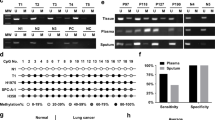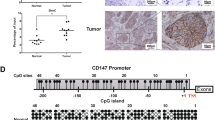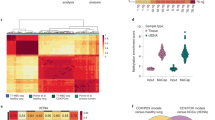Abstract
Recently, the human SRBC (hSRBC) gene, a candidate tumor suppressor gene (TSG), has been mapped to the chromosomal region 11p15.5–p15.4 where frequent allele loss has been described in lung cancer. Aberrant methylation (referred to as methylation) of the promoter region of TSGs has been identified as an important mechanism for gene silencing. Loss of hSRBC protein expression occurs frequently in lung cancer cell lines and sodium bisulfite sequencing of the promoter region of hSRBC in several lung cancer cell lines suggested that methylation plays an important role in inactivating hSRBC. To determine the methylation status of hSRBC in a large collection of primary lung cancer samples, corresponding nonmalignant lung tissues and lung cancer cell lines (N=52), we designed primers for a methylation-specific PCR assay. Methylation was detected in 41% of primary non-small-cell lung cancers (NSCLC) (N=107) and in 80% of primary small-cell lung cancers (SCLC) (N=5), but was seen only in 4% of corresponding nonmalignant lung tissues (N=103). In all, 79% of lung cancer cell lines were methylated and the frequency of hSRBC methylation was significantly higher in SCLC (100%) than in NSCLC (58%) cell lines. Normal hSRBC protein expression was detected in only 18% of primary NSCLCs (N=93) by immunostaining and a significant association between loss of protein expression and methylation was found. hSRBC re-expression was observed after treatment of lung cancer cells with the demethylating agent 5-aza-2′-deoxycytidine. In addition, 45% of the 76 hSRBC immunostaining-negative NSCLCs did not have hSRBC promoter methylation, indicating that other mechanisms of hSRBC expression silencing also exist. Both hSRBC immunostaining and methylation results did not correlate with clinicopathological characteristics of these patients. Our findings suggest that hSRBC is a candidate TSG involved in lung cancer pathogenesis, where expression is frequently inactivated by methylation and other mechanisms.
This is a preview of subscription content, access via your institution
Access options
Subscribe to this journal
Receive 50 print issues and online access
$259.00 per year
only $5.18 per issue
Buy this article
- Purchase on Springer Link
- Instant access to full article PDF
Prices may be subject to local taxes which are calculated during checkout






Similar content being viewed by others
Accession codes
References
Agathanggelou A, Dallol A, Zochbauer-Muller S, Morrissey C, Honorio S, Hesson L, Martinsson T, Fong KM, Kuo MJ, Yuen PW, Maher ER, Minna JD and Latif F . (2003). Oncogene, 22, 1580–1588.
Baffa R, Negrini M, Mandes B, Rugge M, Ranzani GN, Hirohashi S and Croce CM . (1996). Cancer Res., 56, 268–272.
Belinsky SA, Palmisano WA, Gilliland FD, Crooks LA, Divine KK, Winters SA, Grimes MJ, Harms HJ, Tellez CS, Smith TM, Moots PP, Lechner JF, Stidley CA and Crowell RE . (2002). Cancer Res., 62, 2370–2377.
Burbee DG, Forgacs E, Zöchbauer-Müller S, Shivakumar L, Fong KM, Gao B, Randle D, Kondo M, Virmani A, Bader S, Sekido Y, Latif F, Milchgrub S, Toyooka S, Gazdar AF, Lerman MI, Zabarovsky E, White M and Minna JD . (2001). J. Natl. Cancer Inst., 93, 691–699.
Dammann R, Li C, Yoon JH, Chin PL, Bates S and Pfeifer GP . (2000). Nat. Genet., 25, 315–319.
Dammann R, Takahashi T and Pfeifer GP . (2001). Oncogene, 20, 3563–3567.
Fong KM, Kida Y, Zimmerman PV and Smith PJ . (1996). Br. J. Cancer, 74, 1975–1978.
Fong KM, Zimmerman PV and Smith PJ . (1995a). Cancer Res., 55, 28–30.
Fong KM, Zimmerman PV and Smith PJ . (1995b). Cancer Res., 55, 220–223.
Herman JG, Graff JR, Myöhänen S, Nelkin BD and Baylin SB . (1996). Proc. Natl. Acad. Sci. USA, 93, 9821–9826.
Jones PA and Baylin SB . (2002). Nat. Rev. Genet., 3, 415–428.
Kersting M, Friedl C, Kraus A, Behn M, Pankow W and Schuermann M . (2000). J. Clin. Oncol., 18, 3221–3229.
Phelps RM, Johnson BE, Ihde DC, Gazdar AF, Carbone DP, McClintock PR, Linnoila RI, Matthews MJ, Bunn Jr PA, Carney D, Minna JD and Mulshine JL . (1996). J. Cell Biochem. Suppl., 24, 32–91.
Soria JC, Rodriguez M, Liu DD, Lee JJ, Hong WK and Mao L . (2002). Cancer Res., 62, 351–355.
Toyooka S, Toyooka KO, Maruyama R, Virmani AK, Girard L, Miyajima K, Harada K, Ariyoshi Y, Takahashi T, Sugio K, Brambilla E, Gilcrease M, Minna JD and Gazdar AF . (2001). Mol. Cancer Therap, 1, 61–67.
Tran YK and Newsham IF . (1996). Cancer Res., 56, 2916–2921.
Vandamme B, Lissens W, Amfo K, De Sutter P, Bourgain C, Vamos E and De Greve J . (1992). Cancer Res., 52, 6646–6652.
Virmani AK, Rathi A, Zochbauer-Muller S, Sacchi N, Fukuyama Y, Bryant D, Maitra A, Heda S, Fong KM, Thunnissen F, Minna JD and Gazdar AF . (2000). J. Natl. Cancer Inst., 92, 1303–1307.
Winqvist R, Hampton GM, Mannermaa A, Blanco G, Alavaikko M, Kiviniemi H, Taskinen PJ, Evans GA, Wright FA, Newsham I . (1995). Cancer Res., 55, 2660–2664.
Wistuba II, Bryant D, Behrens C, Milchgrub S, Virmani AK, Ashfaq R, Minna JD and Gazdar AF . (1999). Clin Cancer Res., 5, 991–1000.
Xu XL, Wu LC, Du F, Davis A, Peyton M, Tomizawa Y, Maitra A, Tomlinson G, Gazdar AF, Weissman BE, Bowcock AM, Baer R and Minna JD . (2001). Cancer Res., 61, 7943–7949.
Zöchbauer-Müller S, Fong KM, Maitra A, Lam S, Geradts J, Ashfaq R, Virmani AK, Milchgrub S, Gazdar AF and Minna JD . (2001a). Cancer Res., 61, 3581–3585.
Zöchbauer-Müller S, Fong KM, Virmani AK, Geradts J, Gazdar AF and Minna JD . (2001b). Cancer Res., 61, 249–255.
Zöchbauer-Müller S, Lam S, Toyooka S, Virmani AK, Toyooka KO, Seidl S, Minna JD and Gazdar AF . (2003). Int. J. Cancer, 107, 612–616.
Acknowledgements
This work was supported by grants from the Austrian Science Foundation (J1658-MED, J1860-MED), the Austrian Federal Ministry of Education, Science and Culture (GZ 200.062/2-VI/1/2002), the Medical-Scientific Fund of the Mayor of the Federal Capital Vienna (project number 2089), Lung Cancer SPORE P50 CA70907, Department of Defense Grant DAMD170110422 and The Susan G Komen Foundation.
Author information
Authors and Affiliations
Corresponding author
Rights and permissions
About this article
Cite this article
Zöchbauer-Müller, S., Fong, K., Geradts, J. et al. Expression of the candidate tumor suppressor gene hSRBC is frequently lost in primary lung cancers with and without DNA methylation. Oncogene 24, 6249–6255 (2005). https://doi.org/10.1038/sj.onc.1208775
Received:
Revised:
Accepted:
Published:
Issue Date:
DOI: https://doi.org/10.1038/sj.onc.1208775
Keywords
This article is cited by
-
Contribution of DNA methylation and EZH2 in SRBC down-regulation in gastric cancer
Molecular Biology Reports (2020)
-
ROR1-CAVIN3 interaction required for caveolae-dependent endocytosis and pro-survival signaling in lung adenocarcinoma
Oncogene (2019)
-
Identification of intracellular cavin target proteins reveals cavin-PP1alpha interactions regulate apoptosis
Nature Communications (2019)
-
Caveolae and signalling in cancer
Nature Reviews Cancer (2015)
-
Elevation of PRKCDBP, A Novel Transcriptional Target of TNF-α, and Its Downregulation by Infliximab in Patients with Ulcerative Colitis
Digestive Diseases and Sciences (2014)



